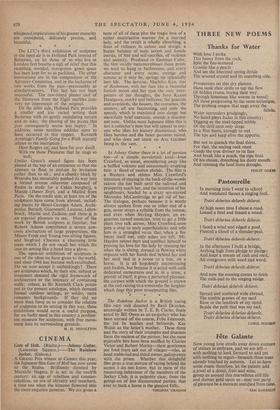CINEMA
taste of all of these plus the tragic love of a rather unattractive warrior for a married lady, and the result is wholly absorbing, a feast of richness in colour and design, a happy balance of male action and female inertia, of lust and self-sacrifice, of violence and serenity. Produced in Eastman Color, the film vividly metamorphoses those prints we tend to hang in bathrooms, and every character and every scene, strange and remote as it may be, springs up splendidly into life. The heroine, Machiko Kyo, star of Rashonzon, with her face like a beautiful foolish moon and her eyes the only inter- preters of her thoughts, the hero Kazuo Hasegawa, stocky and bellicose, the generals and overlords, the houses, the costumes, the scenery, all are fascinating, and only the speech, which is translated into slangy but mercifully brief captions, sounds a discord- ant note. Unlike most Japanese films this is not a collector's item but will appeal to any- one who likes his history dramatised, who likes heroics and the baser passions mixed, and who does not insist on Ava Gardner being in the cast. • • * In Johnny Guitar there is a lot of passion too—of a simple novelettish kind—Joan Crawford, as usual, smouldering away like a baffled volcano and occasionally erupting into a flood of molten cliches. The film is a Western and relates Miss Crawford's intention of staying in the back-of-the-woods saloon she has built until the railroad and prosperity reach her, and the intention of her neighbours, headed by a crazy sex-starved Mercedes McCambridge to get rid of her. The dialogue, perhaps because it is nearly always spoken from one or other end of a gun, never strays a syllable from the intense, and even when Sterling Hayden, an ex- gunman turned musician, tries to get a little plain love talk across, Miss Crawford-soon puts a stop to such superficialities and tells him in a strangled voice that, when a fire burns itself out, only ashes are left. Mr. Hayden retires hurt and confines himself to proving his love for the lady by rescuing her when she is sitting, dressed in flowing white organza with her hands tied behind her and her neck tied in a noose to a tree, on a horse. It is all hopelessly unconvincing and foolish, but because it is acted with such dedicated earnestness and is, in a sense, a parody of itself, it gives a perverted pleasure, the corpses with which the ground is strewn at the end raising to a crescendo the laughter which dogs this poor unsuspecting film.
• • The Rainbow Jacket is a British racing film very well directed by Basil Dearden, amusingly written by T. E. B. Clarke, finely acted by Bill Owen as an ex jockey who has been warned off the course, Fella Edmonds, the lad he teaches and befriends, Kay Walsh as the latter's mother. These three and the story of their triumphs and disasters form the nucleus of the picture, but the most enjoyable bits have been snaffled by Charles Victor and Robert Morley—these gentlemen are bred from salt out of vinegar—who, as head stable-lad and titled owner, gallop away with the prizes. Whether this delightful film gives a true picture of racing behind the scenes I do not know, but in spite of the reassuring behaviour of the members of the Jockey Club, it is palpably clear, from the goings-on of less disinterested parties, that ever to back a horse is the greatest folly.


































 Previous page
Previous page